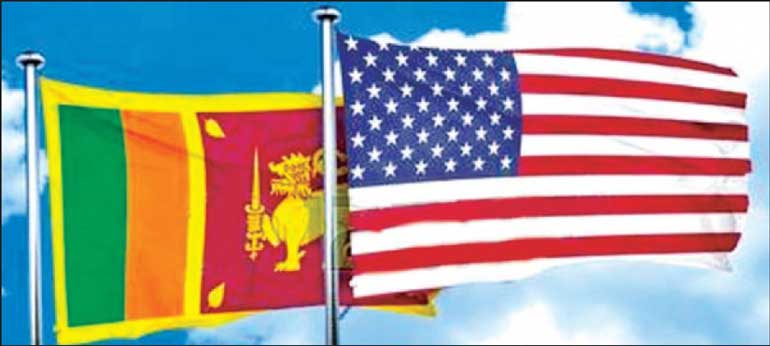Sunday Feb 15, 2026
Sunday Feb 15, 2026
Monday, 23 August 2021 00:00 - - {{hitsCtrl.values.hits}}

The dramatic events in Afghanistan may act as a catalyst for a renewed and enlarged US focus on Sri Lanka
 Having led the country deeper and deeper into a quagmire of an aggressive virus pandemic and depressed economy, the GR-MR-BR trio is now scrambling to repair the damage it has caused to Sri Lanka’s foreign relations.
Having led the country deeper and deeper into a quagmire of an aggressive virus pandemic and depressed economy, the GR-MR-BR trio is now scrambling to repair the damage it has caused to Sri Lanka’s foreign relations.
Foreign policy seems to be receiving a degree of urgency and critical dimension, partly because of the approaching UNHCR Council meeting to be held in Geneva on 13 September, and partly because of the regional geo-political dynamics arising out of the return of a new generation of Taliban in Afghanistan.
It appears that when UNHCR meets this time, the first item on the agenda would be to audit Sri Lanka’s record of progress in meeting the demands stipulated in last year’s resolution. Obviously, the country’s representatives would strive hard to avoid the repetition of their shoddy performance in 2020. It was their diplomatic amateurism that was largely responsible for that debacle.
This disappointment must have been one of the reasons why President GR was compelled to reshuffle the cabinet and shift Dinesh Gunawardena from foreign affairs to education and Professor G.L. Peiris from education to foreign affairs. How much the professor is going to achieve in Geneva this time is yet to be seen. The situation there demands diplomacy of the highest order and not simply an academic ability to argue legal points.
Sri Lanka’s foreign policy has taken a dramatic shift from its commitment to non-alignment to one of pro-China. This shift, which actually started during the Mahinda Rajapaksa (MR) presidency (1905-1915), although China-Lanka friendship preceded long before that time, was no doubt necessitated by the constraints of a civil war, which MR wanted to win at any cost. Yet, it failed to take into account the strategic position of the island in the Indian Ocean and the rising geo-political contest growing already at the time between an emerging regional power, China, and its imperial rival US with its Western allies including India and Japan.
As US-China cold war gained momentum, Sri Lanka’s pro-China policy became a concern to US when the current Rajapaksa regime prevaricated for some time and then rejected outright the US Millennium Challenge Corporation. This was followed by the scandalous rejection of US ally India’s bid to build and operate the East Container Terminal. On top of all, is the Colombo Port City (CPC), built entirely with Chinese capital, technology and labour is virtually going to be under Chinese management and control even though the government claims otherwise. With the recent loan agreement worth 2 billion renminbi ($ 308 million) with China the country is slowly getting caught to a debt trap. GR’s stubborn resistance against Sri Lanka approaching IMF for any financial assistance or advice further advertises his anti-US and anti-Western attitude. His so-called alternate way to development appears for all intents and purposes a pro-China way. Earlier, it was to warn Sri Lanka of its blind tilt towards China that the former US Secretary of State, Michael Pompeo paid a hurried visit to Colombo in October last year and held talks with GR. He dubbed China, a ‘predator friend’. e called China a “predartor friend”. With the domestic situation in the country deteriorating rapidly on the health and economic fronts, and provoking a groundswell of protests there seems to be a realisation that some adjustments have to be made in the Government’s foreign policy. The recent visit of Basil Rajapaksa (BR) to US was not entirely a private affair, but propelled by foreign policy necessities. He is reported to have flown from Los Angelis to Washington to meet US officials and said to have promised to follow a more neutral foreign policy. Before flying to Los Angeles, BR had met the US Ambassador in Colombo and had preparatory talks. Even GR had invited US Embassy officials for talks over a lunch at the President’s House. Surprisingly, one other invitee for that lunch was a prominent member of TNA. It appears that GR may soon renew his invitation to TNA for talks on reconciliation and related matters, and BR is also expected to participate in the talks. US was insisting for some time that the regime must solve the problems of minorities to normalise relations with Washington. Some cynics may consider these moves as pure drama to pass the test in Geneva. But there seems to be some seriousness and the GR-MR-BR trio realises that domestic policy has an impact on foreign policy and vice versa.
Above all this, the dramatic events in Afghanistan may act as a catalyst for a renewed and enlarged US focus on Sri Lanka. Having got routed from Iran already by the Shiite mullahs, the loss of Afghanistan to a new generation of Sunni Taliban is a double blow to US presence in Asia. With China set to emerge as a strong and ‘welcome friend’ of the Taliban regime, US’ ally India is bound to feel threatened by an arc of China friendly regimes in Pakistan, Bangladesh, Sri Lanka and Myanmar.
The China-Pakistan Economic Corridor, an essential component of the One Belt One Road (OBOR) strategy, and which virtually roped Sri Lanka with the CPC, may eventually include Afghanistan also. Of all these countries it is Sri Lanka that is strategically situated in the Indian Ocean, and India will be extremely worried of China’s economic and strategic foothold in the island which, if not checked, would pose a security threat from the southern cost of the subcontinent. India and the US would therefore work in tandem to bring pressure on Colombo to adopt a more neutral position as BR has promised in Washington.
Sri Lankan economy is in dire straits. It desperately needs foreign investment from multiple channels. China’s largesse alone is insufficient. It was a pathetic sight to see the former Minister of Foreign Affairs, Dinesh Gunawardena, almost pleading the other day with Saudi Ambassador to get his government to provide more employment opportunities to Sri Lankans. It has become a cruel choice between exporting goods and services and exporting people to earn revenue. According to one news report, there are nearly 600,000 citizens queuing to obtain visas from foreign embassies to emigrate. All this necessitates that the regime’s foreign policy needs urgent revision. To do that the Government requires the advice of top-class professional diplomats, which unfortunately is in short supply. To overcome this shortage GR has decided to recruit 20 so-called diplomatic professionals from blue-chip companies to serve in different fields. Is this a backdoor entry to join the country’s diplomatic service?
If so, it will be a diabolic mistake not only because it opens the doors to privatisation of foreign policy but also allowing corruption to enter that sector. Anyway, the immediate hurdle to cross is the forthcoming UNHCR Council meeting in Geneva. It is going to be a testing ground for BR’s efforts to change GR-MR’s foreign policy directions.
(The writer is attached to the School of Business and Governance, Murdoch University, Western Australia.)